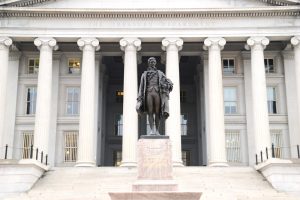The United States has announced another tranche of sanctions on Myanmar’s military government, targeting Myanmar’s defense ministry and two state-owned banks used to buy arms and other goods from abroad.
In a statement yesterday, the U.S. Treasury Department said that the military has relied on foreign sources, including Russian entities under sanctions, to purchase and import arms, equipment, and raw materials to prosecute its war on the anti-junta resistance. Since the February 2021 coup, the statement said, the Ministry of Defense has imported goods and materiel worth at least $1 billion, including from sanctioned entities in Russia.
“Burma’s military regime has leveraged state-run access to international markets to import weapons and materiel, including from sanctioned Russian entities, to continue its violence and oppression,” Under Secretary of the Treasury for Terrorism and Financial Intelligence Brian E. Nelson said in the statement. “We will continue to support the people of Burma and deny the regime access to the means to perpetuate ongoing atrocities.”
In addition to designating the Ministry of Defense, the Treasury Department has also targeted the Myanma Foreign Trade Bank (MFTB) and Myanma Investment and Commercial Bank (MICB), two of the country’s largest government-controlled banks.
According to the Treasury Department, the MFTB and MICB function primarily as foreign currency exchanges that enable the “conversion of kyat to U.S. dollars and euros and the reverse.” In so doing, they allow state-owned enterprises such as the Myanmar Oil and Gas Enterprise (MOGE) access to foreign markets for revenue generation and “enable Burma’s Ministry of Defense and other sanctioned military entities to purchase arms and other materials from foreign sources.”
As a result, these sanctions have a greater potential impact than any that the U.S. has imposed on Myanmar since the coup. They essentially exclude these banks, and by extension, any entity that deals with them, from any contact with the U.S. financial system.
There is therefore the potential for second-order effects in other nations. As Reuters noted in its report on the sanctions, the news of the Treasury announcement was first reported a day earlier in the Thai press. One report cited Thai sources as expressing concerns that the sanctions would impact Thailand and other countries in the region financially because of their connections with the MFTB and MICB. One of the likely reasons that the U.S. has not yet sanctioned MOGE, one of the military regime’s largest sources of foreign exchange, is the potential impact on Thailand, a longtime security ally with good relations with China.
While the U.S. says it has had “regular conversations with the Thai government on Myanmar including how to mitigate the impacts of any sanctions on Thailand or other countries,” in Reuters’ paraphrase, it is not clear what the impact will be in Thailand, nor the potential fallout in terms of U.S.-Thai relations.
A similar lack of clarity concerns the impact that these sanctions will have on the military junta, not least because of the opacity of the military and the nether economy in which it is firmly ensconced. China, which holds a massive reserve of dollars in U.S. Treasury securities, will no doubt remain an important financial lifeline for the junta, but there is no doubt that the move, if properly enforced, will constrain its ability to access U.S. dollars that it needs to buy arms and other goods from foreign sources.

































